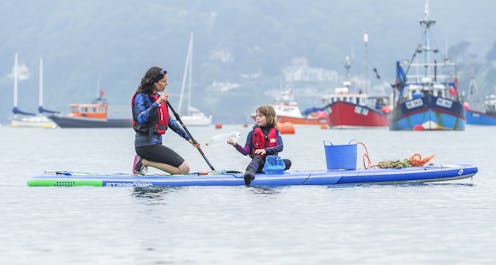Introducing Vitamin Sea – a new series exploring how our connection with the ocean shapes marine conservation
We take a deeper look at the relationship between humans and the ocean and how it affects our health and that of marine habitats.

Our health is intrinsically linked with that of the ocean. Half of the oxygen we breathe comes from tiny plankton in the sea, and our actions on land, however far from the coast we live, influence our waters in so many ways – from plastic litter and sewage pollution, to the fish we eat.
For that reason we’ve launched Vitamin Sea, an exciting collaboration between The Conversation’s environment and health desks.
Anna Turns, Senior Environment Editor
Seven years ago, my daughter and I campaigned for businesses in our home town on the south coast of Devon to stop using single-use plastics.
For two years, we organised beach cleans and school assemblies, persuaded 60 restaurants, hotels and shops to switch to reusables, took part in live TV interviews and led a two-day, 22-mile-long paddleboard expedition to collect litter along every creek of Salcombe estuary.
I’m pretty sure we wouldn’t have bothered going to such extreme lengths had we not already got a strong sense of connection with this beautiful tidal estuary and a fierce need to protect it from litter and pollution. But having grown up in landlocked Bedfordshire, I’m curious about where that stems from.
The science of blue health – the concept that being near, on or in water is good for our physical and mental health – is relatively well-established. Water encompasses everything from ornamental water fountains in city centres to rivers, lakes, lochs and streams, and all flow to the ocean eventually.
Now, this Vitamin Sea series delves into new research that shows our interactions with the sea can influence how marine habitats can be conserved – and that our relationship with the sea is reciprocal, no matter where we live.
Katie Edwards, Commissioning Editor, Health
I grew up in Mexborough, South Yorkshire, a northern post-industrial town with high levels of poverty and deprivation. Seaside visits to the beaches of Skegness, Scarborough and Blackpool were annual holiday events – the sea and its creatures seemed faraway from everyday life.
So what does blue health mean for those who live inland? How can people living in urban environments, many with pressing social issues in their own communities, contribute to marine health? How do those of us living miles from the coast develop a relationship with the sea and experience its benefits?
From the sunscreen we slap on in mid-summer to the wetsuits we wear while swimming, the products we put down our drains and the food we eat, our experts explain how our choices and actions can be good or harmful for the marine environment.
Researchers explain the social science behind the healing power of surf therapy and how they are measuring the benefits of blue health. And scientists shed light on why taking part in a beach clean is actually restorative for your mental health.
Let’s dive in.
Swimming, sailing, even just building a sandcastle - the ocean benefits our physical and mental wellbeing. Curious about how a strong coastal connection helps drive marine conservation, scientists are diving in to investigate the power of blue health.
This article is part of a series, Vitamin Sea, exploring how the ocean can be enhanced by our interaction with it.
